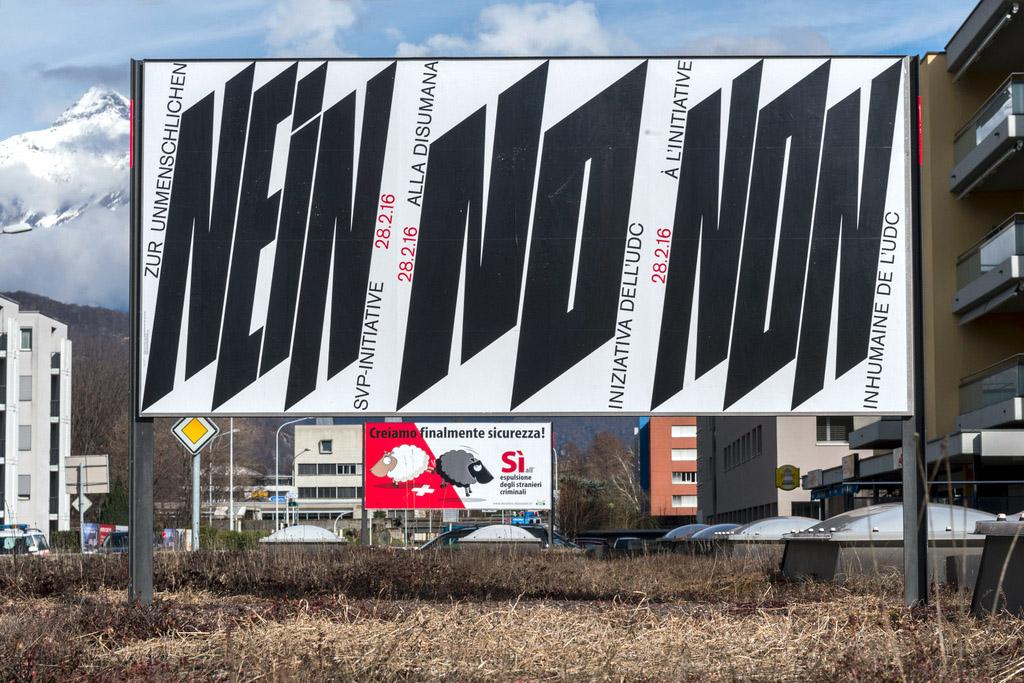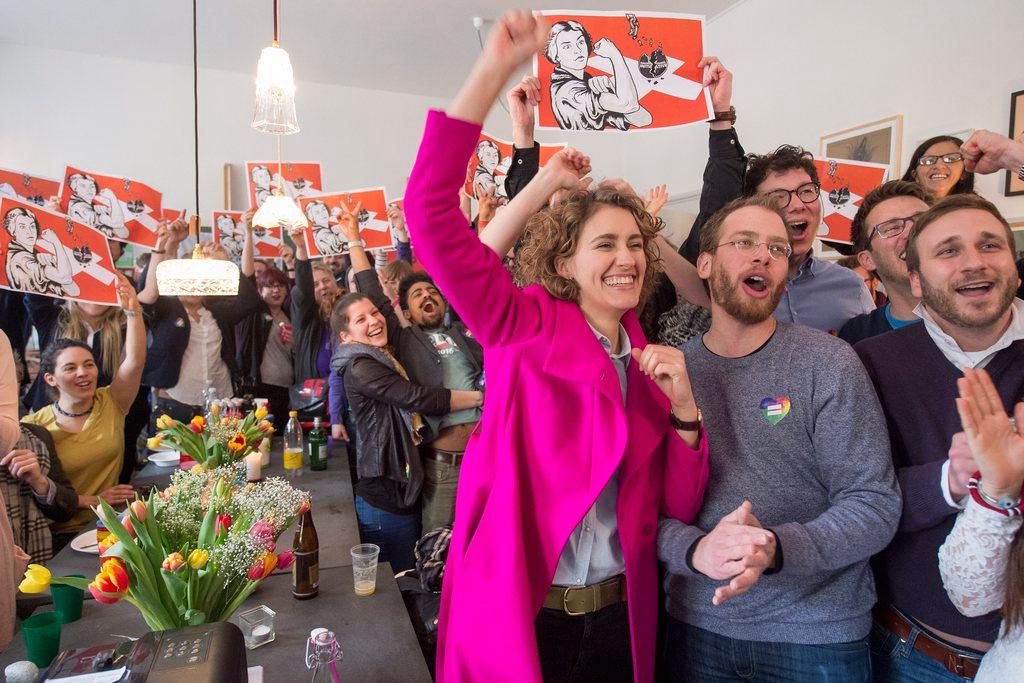A spontaneous, organised and well-financed campaign

A week after the crushing defeat of the Swiss People’s Party initiative that would have forced judges to automatically expel foreigners committed of serious crimes, the result is being interpreted as a sign of the vitality of Swiss democracy.
Unexpected and spontaneous, the ‘No’ campaign was both well organised and financed. The result was a massive 63% voter turnout – something that has rarely been seen in modern Swiss political history – 58.9% of whom voted against the initiative.
“This kind of dynamic campaign is not a completely new phenomenon,” said direct democracy expert and editor-in-chief of the website people2power, Bruno Kaufmann.
“In 1989, the initiative ‘For a Switzerland without an army’ saw a multitude of networks spontaneously organise against the initiative, which was viewed as practically treasonous. The result – 35.6% yes – surprised everyone.”
In 2016, the role played by social media for the ‘No’ campaign had a major impact.
In the month prior to the vote, political activists turned social media networks into weapons of mass mobilisation; personal stories of concerned citizens were posted regularly, alongside a veritable invasion of grinning, colourful and joyous sheep (#happysheep), in a direct parody of the famous People’s Party posters of white sheep butting black sheep out of the country.
Political warhorses
As well as these spontaneous actions, political warhorses like Social Democrat senator, Hans Stöckli, were also active on the front line.
In December, Stöckli was responsible for uniting almost the entire Senate around an appeal to vote no.
Liberal Green parliamentarian Beat Flach convinced 11 former ministers to go public and launched factcheck.ch, a German-language blog that examined the exact consequences the initiative would have if passed.
Using Twitter, the site quickly signed up 90,000 followers. At the same time, four separate committees were hard at work: the left, the centre-right parties, the NGOs and the business community.
“Just before Christmas, Beat Flach telephoned me to see if we could launch a campaign with a small sum of money (five figures), donated by the Swiss Bankers Association,” said Walter Stüdeli, head of a Bern-based communications agency with experience in political lobbying.
For Stüdeli, the proposal was entirely feasible, particularly as the media was “very favourable” to the arguments put forward by opponents of the initiative.
Appeals from 160 law professors and more than 300 current and former parliamentarians came next. On January 24 an “urgent appeal” to reject the initiative appeared on social media and the internet.
The initial 230 signatories included politicians, heads of business, unionists, religious leaders, architects, artists and citizens who had been united under the leadership of Paul Rechsteiner, Social Democratic senator and president of the Trade Union Federation.
Cashed up
It took just 24 hours for the appeal to raise the CHF200,000 ($202,000) needed for an initial poster campaign.
Simple and graphic, the posters featured a single word typed large and bold: “NO”. In one month, small donations of CHF10 or CHF50 pushed total donations to CHF1.2 million.
The money saw the posters plastered on 1,250 billboards in 28 cities across the country. CHF700,000 was spent on an advertising campaign in the press.
“Managing to raise CHF1.2 million by crowdfunding, that’s something we have never seen in Swiss politics,” said Claudine Esseiva, national secretary of the women’s section of the centre-right Radical Party, who coordinated the movement.
“If you add that to the CHF500,000 raised by the four committees, the total was CHF1.7 million.”
The sum put the ‘No’ campaign on a level playing field with its foes. According to Esseiva, the People’s Party spent CHF1 million on letterbox drops and another CHF1 million on posters and advertising.
Stüdeli estimates the People’s Party spent “CHF2 to 3 million, but not more.
In the end they did less than we were expecting”. Consistent with its rules, the People’s Party has refused to reveal how much it spent on the campaign, despite our entreaties.
Republican uprising
Cementing the success of the ‘No’ campaign was the unusually high voter turnout of 63%, whereas the average turnout for referendums over the last 25 years has hovered around 40%. Geneva political scientist Pascal Sciarini described the turnout as a “republican uprising”.
“Something new happened,” said Sciarini.
“There was a convergence of initiatives that each contributed to this result in their own way. My theory is that a number of individual initiatives contributed to motivate people who do not vote regularly, but who realised that there was something big at stake.”
For Kaufmann, the 63% voter participation confirms the phenomenon of “selective participation”, which has often been observed in Switzerland.
A recent study by the University of Geneva demonstrated that it was rare for the Swiss never to vote, but most only vote when the issue is of real concern to them.
And the message this time was difficult to convey. Where the People’s Party bellowed “defending our women and daughters”, their opponents responded with “respect for the principle of proportionality” or “defending rights”.
Not particularly motivating… But these arguments ended up winning the day. For Sciarini, it’s “a reassuring sign” of the health and maturity of Switzerland’s direct democracy.
And next?
Stüdeli “seriously doubts” that a sustainable movement was born on February 28.
“It’s a unique phenomenon, we can’t repeat it every three months,” he said.
On June 5, the Swiss will vote on a new asylum law that the People’s Party is attacking using the referendum mechanism. Stüdeli doesn’t expect this method to work in this instance.
“But it may be possible on their next initiative, which aims to enshrine in the Swiss constitution the primacy of Swiss law over international law.”
Declining support
2009: 57.5% for banning the construction of minarets
2010: 52.9% for expelling foreign criminals (act 1)
2014: 50.3% against mass immigration
2016: 41.1% for enforcing the initiative on the expulsion of foreign criminals
The results of the last four anti-foreigners initiatives from the People’s Party are clearly on a downward curve, a fact which has not escaped party strategist Christoph Blocher who, following the defeat on February 28, declared popular initiatives should be launched less often.
Translated from French by Sophie Douez

In compliance with the JTI standards
More: SWI swissinfo.ch certified by the Journalism Trust Initiative















You can find an overview of ongoing debates with our journalists here . Please join us!
If you want to start a conversation about a topic raised in this article or want to report factual errors, email us at english@swissinfo.ch.